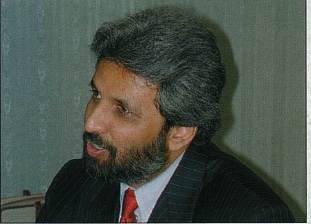By Bawa Jain
A followup report: Millennium World Peace Summit of Religious and Spiritual Leaders,August, 2000
On November 10, 2000, Bawa Jain, the Peace Summit’s secretary-general, addressed a meeting of 3,000 Buddhist leaders, politicians, monks and scholars at the Buddhamonthon shrine in Bangkok, Thailand. He spoke on the summit’s origins, the first meeting at the UN in New York and his future vision. In this excerpt, Bawa explains how Buddhists can contribute to global peace.
The role of Buddhism in building more peaceful societies can clearly be one of major importance. Over 160 Buddhist leaders participated in the World Peace Summit in New York. They came from over 20 countries, including quite a few from the United States, where Buddhism is growing rapidly. The common perception of Buddhism is that it is a religion devoted to the cultivation of peace. It is probably accurate to say that there have been fewer violent conflicts involving Buddhist communities than any other of the major religious traditions. The one exception is the situation in Sri Lanka, which is a terrible tragedy.
Throughout its long history, Buddhism has brought with it the practice of nonviolence and a peaceful approach to communities of different traditions. People around the world today no longer look only to the leaders of their religious tradition for guidance on how to deal with the pressing issues of war and peace, environmental degradation and poverty relief. They look to those noted for their commitments to these causes, including those in the Buddhist tradition, which gives people the tools for their own enlightenment, without dependency on any external force or conditions.
Wherever we organize religious peace initiatives, I know we will have a strong delegation of Buddhist leaders. The essential message that these initiatives must bring is that there can be no peace among nations and no peace with the environment until first we have peace with ourselves. This is the message of Buddhism.
I want to challenge you, as Buddhist leaders. What commitments will you make regarding the global peace process, the environment and the eradication of poverty? I challenge us to find a peaceful resolution to the one conflict that involves a Buddhist community–Sri Lanka. Can the Buddhist leadership be the first religious community to take a united stand against violence? I urge you to be bold and vigorously initiate a peace process and find a resolution to the conflict in Sri Lanka. My life is committed to you all, and I am available in every way to support peace initiatives and convene religious leaders whenever there is tension or conflict in the world. However, we will engage in these initiatives only when we have the political will and the religious commitment demonstrated. Similarly, we must also see what we can do to rebuild the Buddhist community in Cambodia, as well as help our brothers and sisters in Myanmar.
Certainly prayer and meditation are important means of fostering change. I fully know and believe in the power of these spiritual tools. I know that the spiritual practice of each of us contributes to the betterment of the world. But I was taught that practice must be accompanied by action. Remember Mahatma Gandhi’s words “Be the change you want to see.” I saw this daily in the life of my spiritual teacher, the Jain monk H.H. Sushil Kumarji Maharaj. During a time of great tension between the Muslims and the Hindus in India, he went personally to meet with both groups, putting himself in physical danger. He didn’t care for his own personal safety. His only thought was to be a tool for peace. That is why both sides trusted him. He was one of the few people accepted by both the Hindus and Muslims. When the Muslims saw him coming, they opened the doors for him. He was able to help mediate a solution to the problem of that time. I learned from him the importance of putting one’s beliefs into practice through action. He believed that every conflict could be resolved through dialogue. This is our commitment.
Like my religion of Jainism, Buddhism teaches this practice of patient restraint. Your contribution can be very significant in peace initiatives around the world. Your presence in Africa and elsewhere can indeed have a significant impact. I might also suggest the development of a series of action steps on the most pressing issues. Can the Buddhist leadership call for nuclear-free zones? Can we establish models for the sharing of wealth? Can we develop specific action steps as a regional response to the eruption of violent conflict?
There will, for certain, be Buddhist representation on the Council of Religious and Spiritual Leaders for the United Nations that we are developing. A Buddhist Advisory Group could develop proposals on conflict transformation and other issues. Proposals developed by one religious community or for one region could become a global model.
My travels are for the purpose of tapping the best thinking of religious leaders around the world. Collectively, you offer a treasure of Buddhist wisdom. I ask for your continued prayers and support, and your participation wherever possible in the peace initiatives we will be undertaking around the world. And I pray for the success of your work here at this Buddhist Summit.
I would like to share with you this prayer which best expresses the state we all aspire to be. “If there be righteousness in the hearts, there will be beauty in the character. If there be beauty in the character, there will be harmony in the home. If there be harmony at home, there will be order in the nation. If there be order in the nation, there will be peace in the world.” Om, Peace.
